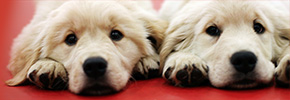Photo: Nuuktok Reg'd American Eskimo Dogs
Photo: Nuuktok Reg'd American Eskimo Dogs
Standard American Eskimo Dog
Origin
A member of the ancient Spitz family of dogs that harks back to prehistoric times, the Eskie is a handsome snow-white dog that is believed to have descended from European spitz breeds. The predecessors may have been the white German Spitz, Keeshond, Pomeranian and the Volpino Italiano (Italian Spitz). The breed first appeared on this continent during the 19th century and arrived here in the company of German immigrants. Eventually, the breed became known as the American Spitz. First registered with the United Kennel Club (in the U.S.) in 1913, the Eskie underwent a name change to American Eskimo Dog in 1917. The American Kennel Club recognized the breed in 1995.
Temperament
The Eskie is a family-oriented dog noted for its intelligence and ease of training. A fun-loving canine, it enjoys running and playing and is reputed to be gentle with children. Initially wary of strangers, the Eskie will sound off at the approach of those he doesn’t recognize and makes an excellent home guardian.
Activity Level
Alert and active, the Eskie is playful and eager to please. It enjoys being on the move and takes well to agility and kindly obedience training.
Height/Weight
The American Eskimo comes in three separate size divisions – Standard, Miniature and Toy. The Standard measures from 15-19 in (38-48 cm) at the withers.
Coat
The stand-off double coat consists of a dense undercoat with longer guard hairs growing through it to form the straight outer coat. The Eskie carries a noticeably thicker mane around the neck area, forming a ruff. The rump and hind legs also carry thicker, longer hair. The tail is plumed and carried over the back.
Colour
The most desirable colour is pure white, though white with biscuit or cream is permissible.
Grooming
Grooming is somewhat easier than one might expect of a long-haired white dog due to a natural oil in the coat that repels dirt. However, the Eskie will still require the occasional bath. Regular brushing is recommended, particularly in the spring when the Eskie will normally drop its winter coat. Chien esquimau américain (standard)
Origine
Un membre de la famille des spitz, chien qui remonte à la préhistoire. L’esquimau américain est un superbe chien blanc comme neige qui, croit-on, est le descendant des spitz européens. Ses prédécesseurs sont probablement le grand spitz blanc d’Allemagne, le keeshond, le poméranien et le Volpino italiano (spitz italien). Cette race est arrivée sur le continent au cours du 19e siècle, accompagnant des immigrants allemands. Éventuellement, on lui a donné le nom de spitz américain. D’abord enregistré par l’United Kennel Club (aux É.-U.) en 1913, son nom est devenu chien esquimau américain en 1917. L’American Kennel Club a reconnu la race en 1995.
Tempérament
L’esquimau américain est un chien de famille reconnu pour son intelligence et il est facile à entraîner. Chien enjoué, il adore courir et jouer et il est très doux avec les enfants. Initialement méfiant à l’égard des étrangers, l’esquimau américain donnera l’alerte à l’approche d’inconnus et fait un excellent gardien.
Niveau d’activité
Alerte et actif, l’esquimau américain est enjoué et veut plaire. Il aime bouger et peut faire un très bon chien d’agilité et d’obéissance.
Taille/poids
L’esquimau américain se présente en trois catégories de taille différente – standard, miniature et nain. Le standard mesure entre 15 et 19 po (38 à 48 cm) au garrot.
Robe
La robe double se compose d’un poil de couverture raide et écarté et d’un sous poil dense avec des poils plus longs qui dépassent le sous poil pour former le poil de couverture. Il possède une collerette prononcée autour du cou. Le poil est aussi plus long sur la croupe et les membres postérieurs. La queue est fournie et portée enroulée sur le dos.
Couleur
De préférence blanc pur, quoique blanc avec un crème biscuit soit permis.
Toilettage
Le toilettage est un peu plus facile que ce à quoi on peut s’attendre d’un chien blanc à poil long en raison de l’huile naturelle que contient le poil, laquelle repousse la saleté. Toutefois, Il faut le laver de temps à autre. On recommande un brossage régulier, surtout en période de mue printanière.
Visit the Puppy List to Find a Breeder for this BreedPuppy List


If you’re considering purchasing a purebred pup you can rest assured that you’ve come to the right place.
Un chien de race pure figure-t-il dans votre avenir? Vous êtes au bon endroit!
lire la suite
Read more